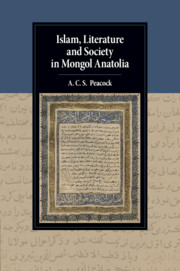'This rich and meticulously researched monograph at last treats Mongol Anatolia in the 13th–14th centuries as a vibrant and multi-faceted society in its own right. The particular originality of the book lies in its analysis of the literary texts being written and read in this period, many previously unknown and still in manuscript, which throw light on the processes of Islamization.'
Charles Melville - University of Cambridge
'The most thorough and perceptive study ever published of the decades of Mongol rule in Anatolia. Based on primary sources, many of which have hardly been used by earlier scholars, it throws a flood of light on the process of Islamisation in what would ultimately become Turkey.'
David O. Morgan - University of Wisconsin-Madison
'Deploys a depth and variety of source materials and novelty of approach to the study of religious, political, and linguistic change in Mongol Anatolia. Its conclusions differ startlingly from most scholarship on the subject, setting off reverberations that will be felt in scholarly circles far and wide.'
Scott Redford - SOAS, University of London
'Peacock has written an erudite, meticulously researched, and insightful work drawing on fascinating new material from rarely used sources. Tackling a wide array of topics from Sufism, vernacular religious literature to apocalyptic thought, this is a major contribution not only to the growing body of work on medieval Anatolia but also to Islamic studies.'
Sara Nur Yildiz - Max Planck Institute for the History of Science
'This gripping book is set in one of the darkest periods of Soviet history, the last years of Stalin. Using declassified materials Slaveski vividly shows how remaking Ukraine after the German occupation and the Red Army's defeat of the Wehrmacht was accompanied by corruption, violence and for many destitution. The result, as his brilliant analysis demonstrates, was incessant conflict between central and local authorities. The legacy of the chaotic post-war years is both an historical and contemporary phenomenon. This book is an invaluable contribution to understanding modern Ukraine.'
John Barber - University of Cambridge
'This fascinating story of ordinary people fighting back successfully against Stalinist officialdom is an example of how scholars can draw larger implications from local studies. Filip Slaveski's important book offers a fresh approach to Stalinist economy and society. It changes our understanding of Soviet history after World War II by restoring agency to the lowly villagers and revealing the social tensions missed by previous historians.'
Serhy Yekelchyk - University of Victoria



